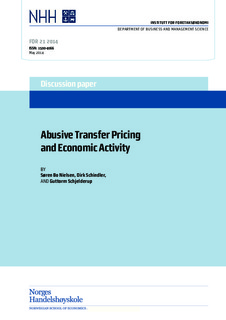Abusive transfer pricing and economic activity
Working paper
Permanent lenke
http://hdl.handle.net/11250/217625Utgivelsesdato
2014-05Metadata
Vis full innførselSamlinger
- Discussion papers (FOR) [566]
Sammendrag
This paper investigates how concealment costs of transfer pricing and the prob-
ability of detection affect transfer pricing and firm behavior. We find that transfer
pricing in intermediate production factors does not affect real activity of a multi-
national firm if the firm's concealment effort as well as the probability of being
audited by tax authorities are conditioned on the amount of shifted profits. If tax
authorities rely on the standard OECD arm's-length principle instead by reacting
to a deviation of the transfer price from the market price, the multinational will
for tax reasons adjust its production structure. A policy implication of the paper
is that it should be preferable to condition audits on the amount of income shifted
rather than on the distortion of the transfer price proper. Another policy finding is
that improving the quality of tax law might be superior to higher detection effort.
The former reduces profit shifting and concealment effort, whereas the latter leads
to more wasteful use of resources on concealment and has an ambiguous effect on
profits shifted.
